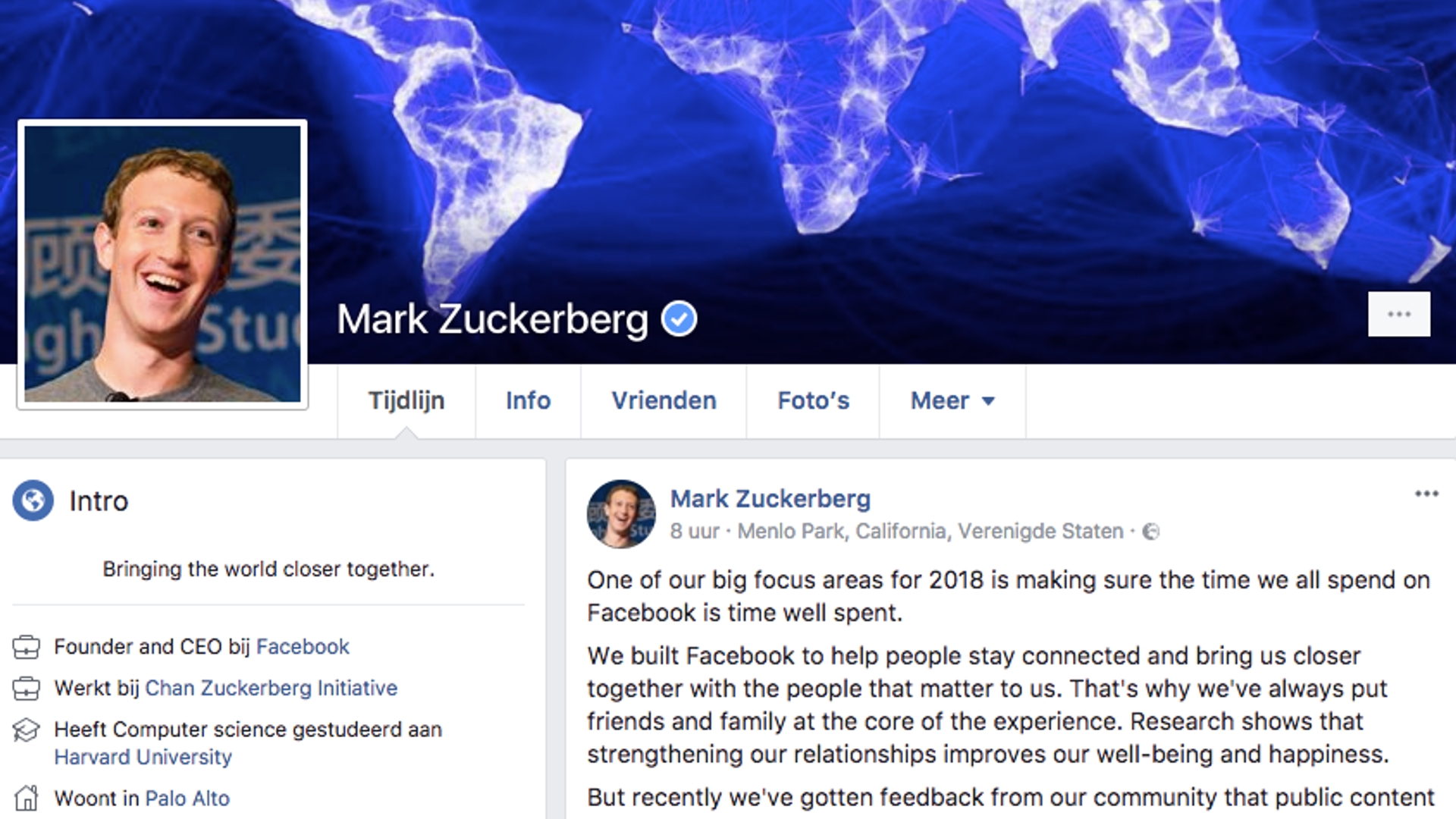De opiniesite van BNNVARA met actueel nieuws en uitgesproken meningen
Facebook gaat op de schop: minder nieuws, meer sociale contacten
•

Het sociale medium Facebook gaat op de schop. Dat heeft oprichter Mark Zuckerberg gezegd. Voortaan moet de nadruk veel meer gaan liggen op ‘betekenisvolle sociale interacties’ in plaats van dat timelines dienen als nieuwsoverzicht.
Volgens Zuckerberg is de balans zoek, door de toename van ‘publieke content’, ofwel berichten van bedrijven, merken en media. Dat heeft volgens critici bovendien een verslavende werking en daar wil Zuckerberg naar eigen zeggen van af. Zuckerberg wil dat de gebruikers minder tijd door gaan brengen op Facebook, maar dat de tijd die ze doorbrengen op het medium ‘waardevoller’ wordt.
Zuckerberg schrijft:
"One of our big focus areas for 2018 is making sure the time we all spend on Facebook is time well spent.
We built Facebook to help people stay connected and bring us closer together with the people that matter to us. That’s why we’ve always put friends and family at the core of the experience. Research shows that strengthening our relationships improves our well-being and happiness.
But recently we’ve gotten feedback from our community that public content — posts from businesses, brands and media — is crowding out the personal moments that lead us to connect more with each other.
It’s easy to understand how we got here. Video and other public content have exploded on Facebook in the past couple of years. Since there’s more public content than posts from your friends and family, the balance of what’s in News Feed has shifted away from the most important thing Facebook can do — help us connect with each other.
We feel a responsibility to make sure our services aren’t just fun to use, but also good for people’s well-being. So we’ve studied this trend carefully by looking at the academic research and doing our own research with leading experts at universities.
The research shows that when we use social media to connect with people we care about, it can be good for our well-being. We can feel more connected and less lonely, and that correlates with long term measures of happiness and health. On the other hand, passively reading articles or watching videos — even if they’re entertaining or informative — may not be as good.
Based on this, we’re making a major change to how we build Facebook. I’m changing the goal I give our product teams from focusing on helping you find relevant content to helping you have more meaningful social interactions.
We started making changes in this direction last year, but it will take months for this new focus to make its way through all our products. The first changes you’ll see will be in News Feed, where you can expect to see more from your friends, family and groups.
As we roll this out, you’ll see less public content like posts from businesses, brands, and media. And the public content you see more will be held to the same standard — it should encourage meaningful interactions between people.
For example, there are many tight-knit communities around TV shows and sports teams. We’ve seen people interact way more around live videos than regular ones. Some news helps start conversations on important issues. But too often today, watching video, reading news or getting a page update is just a passive experience.
Now, I want to be clear: by making these changes, I expect the time people spend on Facebook and some measures of engagement will go down. But I also expect the time you do spend on Facebook will be more valuable. And if we do the right thing, I believe that will be good for our community and our business over the long term too.
At its best, Facebook has always been about personal connections. By focusing on bringing people closer together — whether it’s with family and friends, or around important moments in the world — we can help make sure that Facebook is time well spent."
We built Facebook to help people stay connected and bring us closer together with the people that matter to us. That’s why we’ve always put friends and family at the core of the experience. Research shows that strengthening our relationships improves our well-being and happiness.
But recently we’ve gotten feedback from our community that public content — posts from businesses, brands and media — is crowding out the personal moments that lead us to connect more with each other.
It’s easy to understand how we got here. Video and other public content have exploded on Facebook in the past couple of years. Since there’s more public content than posts from your friends and family, the balance of what’s in News Feed has shifted away from the most important thing Facebook can do — help us connect with each other.
We feel a responsibility to make sure our services aren’t just fun to use, but also good for people’s well-being. So we’ve studied this trend carefully by looking at the academic research and doing our own research with leading experts at universities.
The research shows that when we use social media to connect with people we care about, it can be good for our well-being. We can feel more connected and less lonely, and that correlates with long term measures of happiness and health. On the other hand, passively reading articles or watching videos — even if they’re entertaining or informative — may not be as good.
Based on this, we’re making a major change to how we build Facebook. I’m changing the goal I give our product teams from focusing on helping you find relevant content to helping you have more meaningful social interactions.
We started making changes in this direction last year, but it will take months for this new focus to make its way through all our products. The first changes you’ll see will be in News Feed, where you can expect to see more from your friends, family and groups.
As we roll this out, you’ll see less public content like posts from businesses, brands, and media. And the public content you see more will be held to the same standard — it should encourage meaningful interactions between people.
For example, there are many tight-knit communities around TV shows and sports teams. We’ve seen people interact way more around live videos than regular ones. Some news helps start conversations on important issues. But too often today, watching video, reading news or getting a page update is just a passive experience.
Now, I want to be clear: by making these changes, I expect the time people spend on Facebook and some measures of engagement will go down. But I also expect the time you do spend on Facebook will be more valuable. And if we do the right thing, I believe that will be good for our community and our business over the long term too.
At its best, Facebook has always been about personal connections. By focusing on bringing people closer together — whether it’s with family and friends, or around important moments in the world — we can help make sure that Facebook is time well spent.
Praat mee
0/1500
